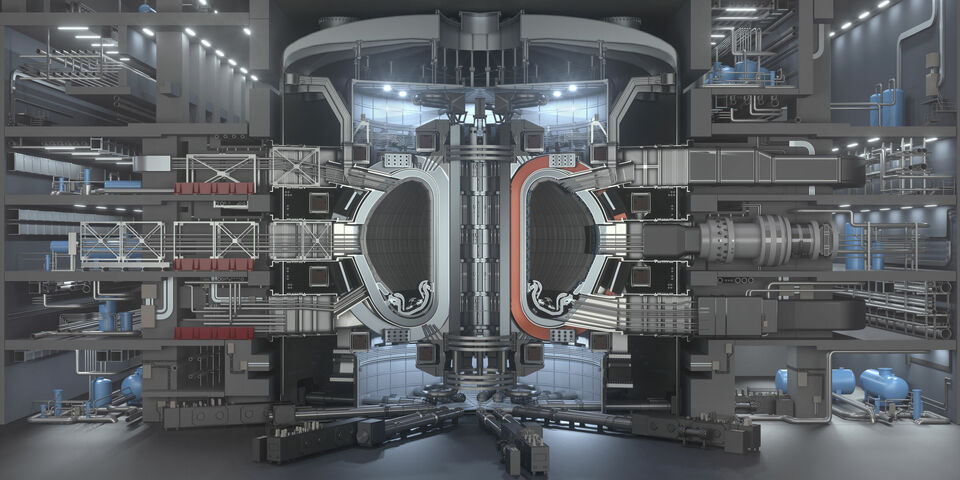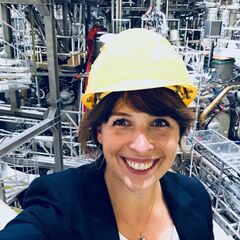“What role does TU/e want to play in the realization of nuclear fusion energy?”
We are getting ever closer to achieving nuclear fusion energy. Both the Netherlands and TU/e can play an important role on the global nuclear fusion stage. However, this requires close cooperation between academia and industry. A step was taken to that end during the very first Dutch Fusion Day organized by TU/e, DIFFER and ILO-net on May 3. Fusion expert Josefine Proll talked about the possibilities for TU/e.
During the morning program, the room was filled with scientists from different technical universities, but mostly from TU/e. They sat side by side with people from industry. Many a guest eagerly took advantage of that opportunity. “We can produce anything you want,” an industry partner said to the audience, albeit unsolicited. “We have positions for PhD candidates and can conduct your experiments,” said a TU Delft scientist after his presentation on superconductors. The desire to work together intensively was palpable even before the networking drinks party began.
What is nuclear fusion?
Nuclear fusion is the principle that powers the sun and other stars. Scientists who want to replicate this on Earth consider it the key to an inexhaustible, clean and cost-effective source of energy. Nuclear fusion involves fusing atomic nuclei under extreme heat and pressure. Usually, these are light atomic nuclei, such as tritium and deuterium. This process releases an enormous amount of energy, but first, it needs to be set in motion and kept under control. Not only does this require a lot of energy, it also requires research into materials for the reactor, the prevention of energy loss and ways to keep the plasma under control, among other things. By the way, do not confuse nuclear fusion with nuclear fission, which is used in nuclear power plants today and produces much more radioactive waste because it involves heavier and more radioactive atomic nuclei, such as plutonium and uranium.
Don’t kill your darlings
Associate professor Josefine Proll (Applied Physics) represented TU/e at the event. As a researcher into plasma turbulence in nuclear reactors, she has seen international interest in fusion energy grow. “We’re getting ever closer to achieving clean, infinite nuclear fusion energy. Because of this, it’s getting easier to find investors, young nuclear fusion companies are getting off the ground and there is plenty of research investment.” Proll therefore believes now is the time to determine what role the Netherlands and TU/e want to play in this. “Which slice of the nuclear fusion pie will we take responsibility for?”
At any rate, there will be no lack of possibilities for TU/e. During her presentation, Proll brought up all kinds of opportunities for interdisciplinary research at the university. “For example, we could focus on solving problems regarding heating and controlling plasma, making digital twins to test out beforehand how plasma will react, advanced diagnostics to achieve faster and better research results, or using artificial intelligence to speed up processes.” When asked by a member of the audience to choose one or two, she responded firmly: “I don’t believe in 'kill your darlings'. We can do all of it.”
In addition, Proll emphasized the university’s strong position due to its existing broad (inter)national network.“We have a strong high-tech industry in the Netherlands and TU/e is the place for nuclear fusion research. DIFFER is right next door. We also have strong ties to large fusion labs, which our students regularly visit. The industrialization of nuclear fusion is taking off and we’re in a good position to contribute to that.”A program is being set up by EIRES to further expand that position.
What is TU/e doing in the field of nuclear fusion?
TU/e has various collaborations with industry partners, such as the Dutch Institute for Fundamental Energy (DIFFER), a major player worldwide in the field of nuclear fusion energy research, and conveniently located on campus. TU/e is also active on the international level, for example through the European consortium EUROfusion, which promotes scientific research and experiments related to nuclear fusion, like the ITER Project, which has been described as the world’s largest upcoming experiment “set to prove that fusion power is feasible”. In addition, TU/e is one of the few universities in Europe to offer a renowned master’s program specifically focused on nuclear fusion and various related fields. As a result, new studies are published regularly that bring us one step closer to achieving nuclear fusion.
Social debate
Although there are rapid scientific and technological developments, one crucial point for applicable nuclear fusion energy lags behind. Proll highlighted it prior to the presentation and afterwards during a round of questions in the audience: there needs to be societal support for nuclear fusion energy. “People are not properly informed yet about the potential of nuclear fusion. Of course: it is expensive and the residual waste is a problem, but because of the stigma surrounding nuclear energy, there is an unnecessary amount of fear. Sooner or later there will be a nuclear fusion reactor in Europe. I think the Netherlands would be a fantastic place for that, but it can’t be done without getting society on board. That is why a societal discussion is sorely needed.”
What that discussion should look like was briefly touched upon during the last presentation of the morning. After all the technical and physics presentations, professor of Energy & Climate Ethics Behnam Taebi (TU Delft) was the only social scientist to take the floor. In his presentation, he reflected on the societal debate surrounding nuclear fission, which has been the same for decades: we either do it or not. Supporters see an inexhaustible source of energy and opponents mainly see the dangers of nuclear power.
Fissile material
“But the world has become much more complex,” Taebi explained to the audience. “Policies surrounding nuclear energy are changing. Safety is always the first priority when building nuclear power plants, but new nuclear reactors must now also be sustainable and affordable enough to compete with other energy technologies.” On top of that, public support for nuclear energy is just as complex and can change just like that. “Because of the war in Ukraine and the attacks that took place near the nuclear power plant there, people saw the danger of such facilities in time of war. On the other hand, people recognized the importance of energy security because of the gas crisis. Those two viewpoints coexist.”
According to Taebi, broad support for nuclear fusion in society is only possible if we listen to what the Dutch people think is important. This should happen before the construction of nuclear fusion power plants, so that those values can be incorporated into the design process. He made an initial suggestion to this end, referring to the 2022 report Splitting the Atom, Splitting Opinion? by the Council for the Environment and Infrastructure. In it, five defining values were identified for the public debate on nuclear energy: energy supply certainty, affordability, safety and security, sustainability and distributive justice. “Nuclear fusion energy is a long-term project and that requires public discussions about what we consider important. However difficult that may be.”




Discussion